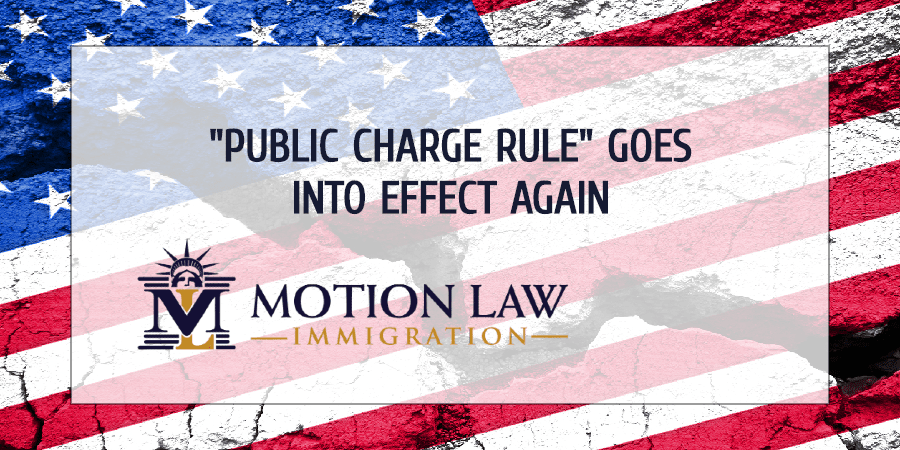“Public Charge Rule” Goes into Effect Again

The “Public Charge Rule” during the pandemic
Broadly speaking and to give an overview, the “Public Charge Rule” states that immigration officers of the US Citizenship and Immigration Services (USCIS) have the power and right to reject requests if the applicant could become an unnecessary burden on the country.
With this, we mean that immigrants must meet certain requirements so that they are not a burden to the local economic system.
This rule works for immigrants who plan to enter the US for the first time, as well as for those who already reside in the country, but need to adjust their immigration status or request any other legal permit.
There are some exceptions to the rule such as asylum seekers, refugees, victims of crime or human trafficking, inter alia.
The latest version of this rule was implemented in February, 2020, by the Department of Homeland Security (DHS). However, the public charge rule was suspended by a New York court in late July due to the threat posed by the global Coronavirus pandemic.
The judge declared that many immigrants avoid using medical services during the health crisis because their immigration applications could be rejected by the USCIS. This posed an imminent threat to the US, primarily because immigrants could become carriers of the virus if they do not use medical services or could put their lives at risk for fear of deportation.
Therefore, immigrants who have used any medical benefits during the massive outbreak of Coronavirus in the North American territory since the end of July will not have a “Public Charge” impact when submitting an immigration application.
Court gives green light to the resumption of the “Public Charge Rule”
On September 11, 2020, the Second Circuit Court of Appeals lifted the suspension of the “Public Charge Rule” and declared that the USCIS can re-implement it for immigration services nationwide.
It means that, as of that date, the components of the rule are in effect again across the US and any immigration application will be evaluated taking this rule into account.
It is important to clarify that the US continues to be the main epicenter of the global pandemic and that is the reason why dozens of activists raised their voices against the decision of the Second Circuit.
However, despite the court’s decision, the USCIS has yet to announce how the rule will be implemented going forward and its official website has not been updated.
Do you need to submit an immigration application?
In light of sudden changes implemented in the immigration sector during the current health crisis, the best recommendation is to have the constant accompaniment of experts, who are up to date with immigration policies.
In this way, you ensure that you are choosing the right process and that you are organizing the required documentation correctly.
If you have any questions about an immigration issue or relating to a case you may have currently in progress, then please don’t hesitate to contact us for a FREE Phone Consultation with one of our expert immigration attorneys.
Simply call Motion Law today at: (202) 918-1799.